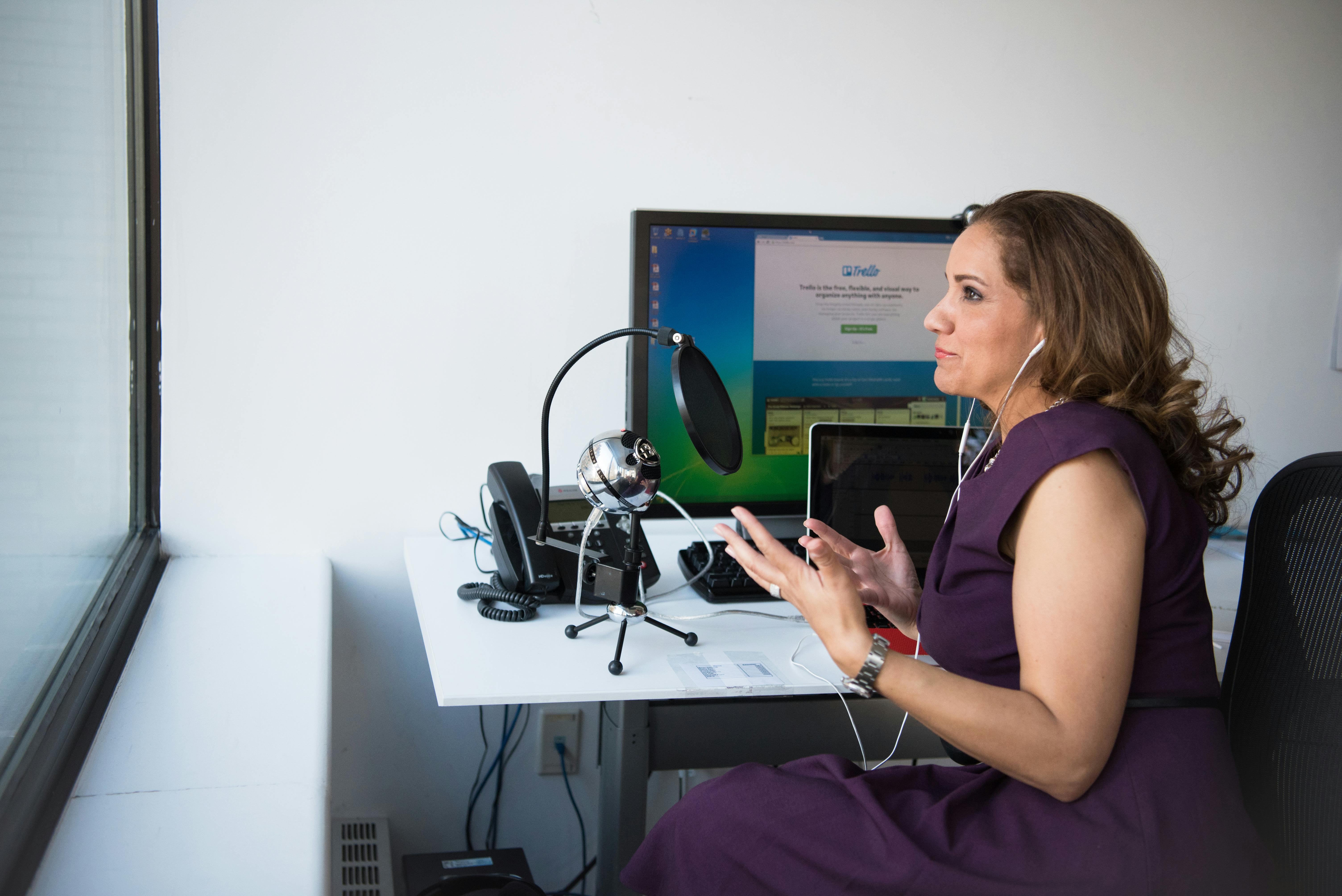Online Depth Interviews

Copyright: LinkedIn Sales Solutions
In the world of marketing, research isn’t just about the numbers. Qualitative research proves just as important as its quantitative counterpart. It’s a great way to find out what your target audience wants, how to improve your products or services, and how your offerings fit into your target audience’s life. There are many ways to conduct qualitative research, including through the use of:
- Surveys
- Focus groups
- Online depth interviews
- Online bulletin boards
- Observational techniques
For the sake of this guide, we will focus on the online depth interview in research methodology. Specifically we’re outlining what depth interviews are, how they are characterized, advantages and disadvantages of using them, and more. Let’s dive in.

Copyright: Julia M Cameron
What Is an Online Depth Interview?
The online in-depth interview definition is a qualitative research method in which you perform instructed one-on-one interviews attempting to gain opinions of respondents. Similar to surveys, the opinions you’re looking for will cover certain topics, products, or services that your business cares about.
What can an in-depth interview do that a survey cannot, though? As the name of this type of research suggests, online depth interviews go deeper into what participants think and why they think it. Because you talk directly to participants, you can ask follow-up and clarification questions to ensure you get a full understanding of what participants are thinking. Interviewees, too, can ask for explanations on questions they may not understand.
Another way in which online depth interviews differ from surveys is that you can observe the behaviors, tone, and facial expressions of the participants. This capability allows you to put together a better picture of how a participant feels about a certain topic, product, or service.
An online depth interview is the preferable research method when you want feedback from certain groups of people instead of the broader population. For example, if you work for a software as a service business, you might decide to invite employees at tech companies to participate in an interview. You can also interview people who have never worked with your business, those who have and didn’t like it, and those who did and liked it to get more well-rounded feedback.
To get a fuller understanding of what online depth interviews are and what they do, it helps to look at their characteristics.

Copyright: Tumisu
What Are the Characteristics of an Online Depth Interview?
Some of the main characteristics of online depth interviews are flexibility, open-ended questions, completeness, conversation, recording responses, and productivity. Let’s take a closer look at what each of these mean.
- Flexibility: Because these interviews are one-on-one, they are easier to schedule than something like focus groups that require more people. Conducting them online also makes them convenient because you don’t have to worry about scheduling travel. An interview that might involve a few days to complete when taking travel into account will only take about an hour when online. This flexibility allows you to talk to people who may have busy schedules or live far away.
- Open-ended Questions: Online depth interviews should consist of mostly, if not all, open-ended questions. By doing so, you’ll get a better understanding of what the participant thinks and why.
- Completeness: Open-ended questions automatically lead to deeper answers than yes or no questions. However, this research method also allows for more of a sense of completeness because you can ask follow-up questions as needed, allowing you to get a better sense of the participant’s thoughts.
- Conversation: An online in-depth interview in research should be conversational. This means that the participant is asking you questions, too. It also means you are engaging with the participant instead of asking one question after another. Conversation allows you to build trust with the participant so that they feel comfortable answering questions openly and honestly.
- Recording Responses: It is important to record interviews with participants as well as to take notes during sessions. These interviews are about research, after all, and you will want to make sure that your research report provides evidence of what participants said. Transcribing recorded interviews is important for getting exact quotes from participants. It is good to note, too, that it is best practice to ask participants if you can record and take notes during the interview before doing it. Nimbus is a qualitative research platform that can record and transcribe interviews to save you time in your research.
- Productivity: The purpose of online in-depth interview qualitative research is to determine how participants feel towards your brand, your products or services, or a specific topic related to what your business does. If your business sells energy drinks, you might ask participants about energy drinks in general as well as their sleep and work schedules. The answers you receive should then drive innovations within your business to give consumers what they want or need.

Copyright: Christina Morillo
What Are the Types of Online Depth Interviews?
There are three types of online depth interviews:
- Structured: You conduct this type of depth interview when you write out all the questions you want to ask beforehand. During the interview, you do not stray from these questions. If you want to make sure that every participant you interview discusses the same topics or questions, this might be the type you choose to use.
- Unstructured: For this type of depth interview, you do not have any set in-depth interview questions for research planned beforehand. Instead, you rely on conversation with the participant to drive your research. If you are a highly experienced interviewer, you might choose this type of interview.
- Semi-structured: This type of depth interview is preferable to the other types. For this one, you plan on a few key questions and topics to cover in the interview, but from there you let conversation dictate what else to ask. This type is the most commonly used because it allows for both depth and focus to make sure you’re getting the research you need to drive innovation.
Now that you know what an online depth interview is, you might be wondering, What are the advantages of in depth interviews? We cover that next.

Copyright: Kampus Production
What Are the Advantages and Disadvantages of Online Depth Interviews?
There are many advantages of in-depth interviews done online, including:
- Number of Participants: This type of research method focuses more on quality than quantity. The purpose of this method is to compile detailed information from a few people instead of getting basic information from a lot of people. Because you need fewer participants for this type of research, it is easier to get the information you need for a well-informed report.
- Quality Information: The interview method allows you to gather the information that you might not have been able to gather through other methods. You can ask questions to learn more about what a participant means or why they think the way they do. The conversation you have with participants gives the interview a more natural flow and allows you to learn related details that your questions might not have prompted otherwise.
- Flexibility: This characteristic of online depth interviews is also one of its advantages. Because they are one-on-one, they are easier to schedule than some other types of research methods. They are also typically more flexible in terms of their structure. For this reason, you can get better, more informed research than you can with something like surveys.
- Rapport: Making your interview more conversational allows you to build rapport with the participant. This, in turn, will make the participant feel more comfortable and encourage them to disclose more of their opinions than they might have using one of the other methods of research.
- Ability to Observe: Something you will see via an online depth interview and not in some other research methods such as surveys is body language. By paying attention to and taking note of the participant’s body language while they are speaking, you can get a better understanding of how they feel about a certain topic, product, or service.
- Privacy: Online depth interviews provide privacy to the participant because it is one-on-one. That means that this method is ideal for discussions about private or confidential information, such as politics, age, or sexual orientation. The more private feel to it will encourage participants to give more detail about their private lives that they may not feel comfortable talking about in a focus group.
- Lack of Peer Pressure: When in a group setting, peer pressure can make participants who feel that their opinions don’t match the rest of the group either lie or keep their opinions to themselves. The one-on-one style of online depth interviews prevents that from happening which, in turn, can lead to more honest answers to your questions. Online depth interviews will also prevent groupthink bias. This type of bias occurs when people change what they are thinking to conform to the rest of the group. Whereas peer pressure means the participant has the same thoughts but doesn’t want to speak out against the other participants, groupthink actually affects the way the participant believes.
Like with any research method, online depth interviews will not work for every situation. They have their disadvantages that make other research methods better depending on the situation. Some of the disadvantages of in-depth interviews online are:
- Time Spent: While you do save time by performing your depth interviews online, even online depth interviews can be time-consuming because you have to transcribe and take notes afterward. Luckily, Nimbus helps to combat this problem by transcribing your interviews for you so that you can focus on putting together your report.
- Biases: Online depth interviews do prevent groupthink bias, but other biases might arise when selecting participants to interview or conducting the interview itself. Some of these are:
- Sampling bias: This means that certain individuals or groups of people are methodically picked more often to participate in interviews, whether it be certain social or economic classes, those in the closest proximity, etc.
- Interviewer bias: Your body language, tone, or facial expressions may change the way a participant responds to an answer.
- Leading questions: You ask your questions in such a way that you prompt the participant to answer a certain way. An example of a leading question is, “What do you like about this product?” A better question would be, “What do you think about this product and why?”
- Confirmation bias: You ask questions or look for answers that confirm your judgments or align with your own beliefs. You may even disregard information that contradicts what you believe.
If you are interested in learning about other biases that could arise during the interview process, check out these articles from Harver and the Academy to Innovate HR.
- Number of Participants: While the number of participants can be an advantage of online depth interviews, it can also be a disadvantage. When you need information about the opinions of a wide range of groups, online depth interviews are not ideal. Interviewing only a few people won’t get you the overall picture you need to represent the entire population.
- Technical Difficulties: As with anything that takes place online, technical difficulties may arise while conducting an online depth interview. These difficulties can lead to distractions, less productive interviews, and having to reschedule the interview.
- Need for Incentives: Online depth interviews have a similar disadvantage to many other research methods in that many people won’t participate unless they have some sort of incentive such as a gift card, a gift bag, or something similar.
Knowing the pros and cons of using online depth interviews for your research will help you better determine when to conduct that type of research method. Now that you have a better grasp of it, how do you prepare for an in-depth interview online? Keep reading to find out.

Copyright: Yan Krukau
How Do You Conduct a Good Depth Interview?
To successfully complete the online interview process, there are several key steps you should follow.
- Figure out what you want to achieve by holding these interviews. Do you want to create a new product or offer a new service? Do you want to make improvements to an already existing product or service? Do you want to figure out how to better market to certain audiences? Determine what you will use this research for, and let it guide the questions you ask and how you choose the people to interview.
- Define the extent of your interviews. This means assigning numbers to:
- How many people to interview
- How many questions to ask
- How many topics to cover
- How much time to give yourself before creating a report on your findings
Having all of this in mind from the start will guide your research and give you a bit of a deadline or cutoff point.
- Set a time limit for interviews. If they are too short, you won’t get enough information from them. If they are too long, you risk your participants getting tired and either shortening answers or answering dishonestly in hopes of ending the interview sooner. How long do in-depth interviews take? A good length to shoot for is 30-60 minutes.
- Choose questions to ask. Make sure they are open-ended and relevant to your topics to get better information for a report. It’s also a good idea to ask questions that lead to some sort of action that your business can take. For example, if you sell solar panels to local businesses, you may ask something like, “What would convince you to use solar panels?” and not “How many solar panels do you have?” It’s a good idea to put ice breaker questions in the beginning to make the participant comfortable; then, move on to questions that get more information from the participant about how they think or feel and why; and end with questions about what next steps your business can take to improve.
- Create a guide outlining everything we’ve covered so far as well as your name and your business’s name. Your guide should include objectives, topics, questions, etc. that you will cover in the interview. You can give one copy to the participant so they know what to expect, and keep one copy for yourself to keep you organized. Note that you can (and should) ask questions outside of those you include on the guide. Asking coworkers to review your guide will ensure that you ask the right questions and stay on topic to get the information you need for your research.
- Complete research training, especially in avoiding bias. Doing so will help you gather the most valuable information possible from your interviews.
- Choose participants. Nimbus can help. We offer over 200 sources to direct you to the right participants for your interviews.
- Schedule and conduct the interview. Before you start, make sure to introduce yourself and give more information about the research you’re doing. Ask for permission to record and take notes of the interview. You should also provide the participant with a consent form to make sure you can use the information they provide you with. Keep the interview conversational and to the time limit. When the interview is finished, thank the participant for their time.
- Transcribe the interview. Send it to the participant to check over for accuracy. Transcribing will also allow you to more easily pull quotes from the interview to include in your research report.
- Repeat the process until you have enough information to complete a report on your findings. Nimbus can help you create it.

Copyright: Vlada Karpovich
Why Are Online Interviews Important for Research?
The main reason why online depth interviews are important for research is because they allow you to hear your target audience’s desires and concerns in the audience’s own words. From there, you can ensure that your business’s brand and what you offer align with those desires and can solve those concerns. Participants may even offer your business solutions for better connecting with its target audience. Respondents may give ideas outright on how to better connect or market to people like them. At the very least, they can explain why they like or dislike something so you can understand what needs to be fixed and what doesn’t.
Online depth interviews lead businesses to make better-informed decisions when it comes to marketing and innovation. Customers drive business, so it’s important that your company stays in touch with its target audience and understands their behaviors. Knowing that can even protect your business from poor investment decisions, leading towards marketing campaigns or other developments that will have a better reaction from the general public and hopefully increase sales. It can even put your business in front of your competition since you can better gauge upcoming trends based on the results of your interviews.
The information you find is only as good as the interviews themselves, though. That’s where Nimbus comes in.
Nimbus: Your Solution for Better Online Depth Interviews
Still somewhat new to online depth interviews and don’t know where to start? Turn to Nimbus. We give you the tools you need to do your research and get the data to drive results. We can help you throughout all stages of the interviewing process, including:
- Finding participants: If you tell us the types of people you want to interview and what sorts of questions you want to ask them, we will search through our 200+ sources to find the right ones for you. We then send you back a list, and you tell us which ones are good fits that you would like to interview.
- Choosing questions: If you’re not sure what questions to ask participants, just ask for help! We will help you come up with the right ones to fuel your research.
- Reporting: We take responses from interviews and put them in a report for you. From there, you can create a complete report to present your findings.
Whether your business is B2B or B2C, we have the services you need to conduct well-planned and executed depth interviews. Ready to learn more? Contact us today to find out how you can improve your research methodologies.
